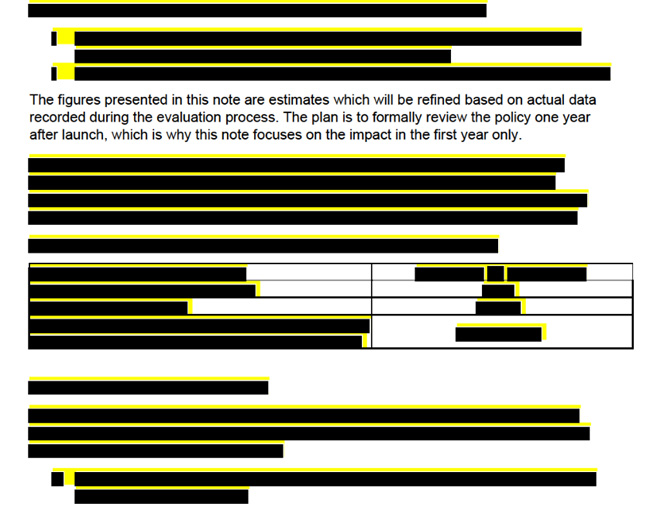Campaigners have criticised the limited ambition behind the Government’s so-called ‘flexible season tickets’ as rail fares rise by nearly 4%, with even higher increases for commuters in London.
On Tuesday, Regulated rail fares, which include season tickets on most commuter journeys, some off-peak tickets and anytime tickets around major cities, rose by 3.8%, based on last July’s RPI inflation measure.
Passengers on Transport for London’s bus and Tube network will see fare rises averaging up 4.8%.

The document released by the DfT has been heavily redacted
The Association of British Commuters (ABC) has published the Department for Transport’s (DfT) internal analysis of the expected impact of its smartcard-based ‘flexible season tickets’ for part-time rail commuters, which were launched last year.
The tickets, which are in fact a carnet model offering eight return journeys over 28 days, have been widely criticised for offering low discounts on the most expensive daily peak returns and therefore falling well short of the discounts available for full-time season tickets.
The analysis shows that the new tickets were expected to generate only 1.1 million additional journeys in their first year, which is 0.5% of the total commuter market, at a cost of £8.3m in lost revenue, based on passengers foregoing more expensive tickets.
This meant the scheme was expected to be halfway to the point at which it would pay for itself – a total 1% increase in commuter journeys.
The document reveals the pricing strategy behind the ‘flexible’ tickets, which were designe to offer a discount of around 20% off a monthly season ticket and a minimum of 5% off the price of an Anytime Day Return.
The ABC said this pricing model fits its predictions at the time of the launch of the tickets, that they ‘are a manipulative pricing strategy designed to upsell passengers back to traditional season tickets’.
It added that with no system of price capping the ‘flexible’ tickets are in fact ‘an extremely inflexible and high risk purchase’.
The DfT analysis, which has been heavily redacted, states that the policy will be reviewed a year after launch.
Campaign for Better Transport (CfBT) said the new tickets can in some cases prove more expensive than a full-time season ticket. It said the Government ‘must address this and improve its offer to part-time commuters’.
Chief executive Paul Tuohy said: ‘Today’s fare rise will do nothing to ease the cost-of-living crisis, it will do nothing help to the economy, and it will do nothing to tackle climate change.
‘If this Government is serious about shrinking transport’s carbon footprint and growing the economy, it must do more to address the high cost of public transport by prioritising fares reform, introducing more contactless and PAYG ticketing and providing a better value flexible commuter ticket to cater to the millions of new hybrid workers.’
Register now for full access
Register just once to get unrestricted, real-time coverage of the issues and challenges facing UK transport and highways engineers.
Full website content includes the latest news, exclusive commentary from leading industry figures and detailed topical analysis of the highways, transportation, environment and place-shaping sectors.
Use the link below to register your details for full, free access.
Already a registered? Login